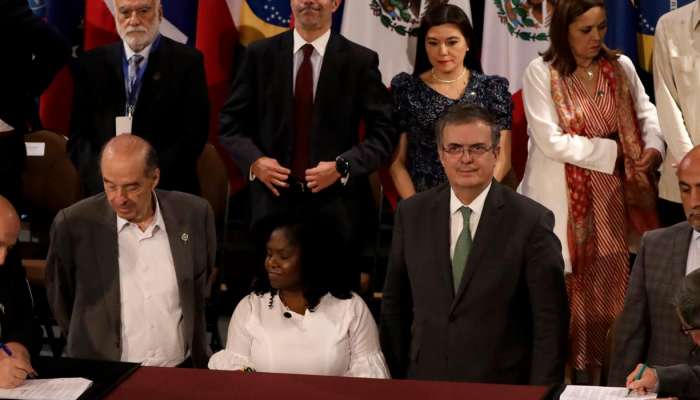
Bogota: Colombian President Gustavo Petro's government and the left-wing National Liberation army (ELN) guerrilla group have taken their first steps towards a bilateral, temporary ceasefire. That's according to the heads of the delegations at the second round of peace talks in Mexico city.
The ELN is the country's last and oldest recognized rebel group. Founded in 1964 by those inspired by Marxist revolutionary icon Ernesto "Che" Guevara and the Cuban revolution, the ELN has taken part but failed in negotiations with Colombia's last five presidents.
"We took the first steps to firm up a bilateral, national and temporary ceasefire which will create better conditions for Colombians' mobilization and participation in the peace process," the rebel group's veteran leader Pablo Beltran said.
Negotiator for the government, Otty Patino, said that the "entire Colombian nation" desired a truce. "We have heard that cry, and we feel that the ELN delegation has also heard it," he said.
Colombia has suffered decades of armed conflict between the state and several left-wing guerilla groups, right-wing militants and drug trafficers. Peace within the country has been a cornorstone issue for President Petro — their first ever left-wing president — who himself was once a member of the now-demobilised M-19 insurgents.
Search for peace
Peace talks resumed in Mexico city on February 13 after the first round took place in Venezuela in November.
In January, the ELF reacted aversely when the government said it had reached a ceasefire with the Marxist guerrillas.
However, in February, Colombia recognized the ELN as a political organisation as well as a rebel group.
Vice President Francia Marquez also urged the negotiators to "stay at the table no matter what."
"It's the first time that I can look at their faces without fear," she had said, in reference to the guerrillas.
Marquez survived a 2019 assassination attempt by unkown gunmen before taking office; she was targeted because of her work defending the region's water resources against mining companies.
Colombia reached a peace deal with its best-known guerilla group, the FARC, in 2016, and secured narrow support for the accord at a referendum soon after.
Petro, himself a former rebel fighter, said in last year's election campaign that he would be seeking "total peace" with the remaining armed rebel groups in a country with very high crime rates that can be attributed in no small part to cocaine cultivation and trafficking.